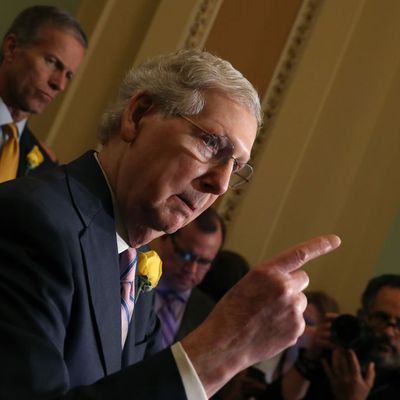
On Monday, Senate Majority Leader Mitch McConnell tweeted a video of a recent interview with Laura Ingraham on Fox News, in which he claimed that House Democrats “would turn us into a country we’ve never been.” For example, a country that resembles something closer to representative democracy for all its citizens. McConnell explained his thinking as it relates to the Democrats’ wish of granting congressional seats to the people of Washington, D.C., and Puerto Rico:
They plan to make the District of Columbia a state — that’d give them two new Democratic senators — Puerto Rico a state, that would give them two more new Democratic senators. And as a former Supreme Court clerk yourself, you’ve surely noticed that they plan to expand the Supreme Court. So this is full bore socialism on the march in the House. And yeah, as long as I’m the majority leader of the Senate, none of that stuff is going anywhere.
The quote is certainly consistent with McConnell’s block-anything-blue legacy, but not all Republicans agree with their leader in the Senate. In March, a bipartisan group of representatives — including Jenniffer González-Colón, the Republican who represents Puerto Rico as a non-voting member — joined the territory’s governor, Ricardo Rosselló, to present a bill that would make the island a state 90 days after becoming law. And in the last two elections, the Republican Party’s official platform has been to “support the right of the United States citizens of Puerto Rico to be admitted to the Union as a fully sovereign state.” But supportive campaign materials and applied politics are different matters: Both the president and House Republicans have stalled throughout the year on providing disaster aid for the island, still reeling from the landfall of Hurricane Maria in 2017.
Whether McConnell is defending against “full-bore socialism” or the advent of (almost) full representative democracy for millions of Americans, the inclusion of Puerto Rico and D.C. in Congress would cause profound shifts to the power balance of the parties — not to mention the Electoral College. Four additional seats in the Senate that skew Democratic could cancel out the Republican advantage of more representation with fewer votes: In the 2014 midterms, the 46 Democratic senators received 20 million more votes than the 54 Republicans in the chamber. In the House, Puerto Rico would end up with around seven electoral votes and D.C. would have one. On population level alone, the district and the territory are certainly worthy of membership. D.C., at 702,455, has more people than Vermont or Wyoming. With a pre-Maria population of almost 3.2 million, Puerto Rico is home to more Americans than 21 states.






























